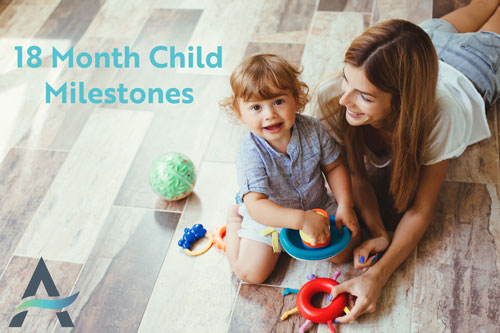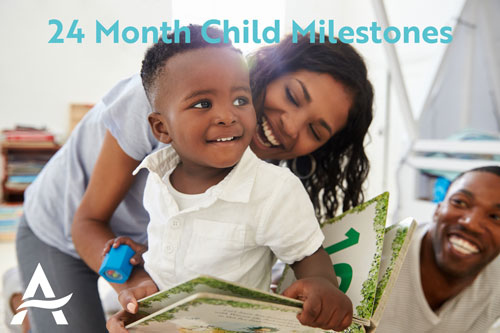A Guide for Stages & Milestones for the Second Year with Your Baby
Did you know that your child's brain is growing and developing faster in the first years of their life than it will at any other period in their life? This can be a scary time for new parents, but by observing your child and positively interacting with your baby, you can be sure that your child is developing appropriately.
The CDC has developed a series of benchmarks, or milestones, that parents can look for children to be achieving by a certain age to help monitor their growth. The main areas of growth that are marked by milestones are social emotional (how a child interacts with their world), language (how a child talks), cognitive (how a child thinks and learns), and motor development (how your child plays and uses their body). Melodie Norton, Motherhood Advocate & Childhood Development Specialist, explains development milestones for children ages 18 to 24 months.

Toddler Milestones: 18 Months

Language Development
- says several single words
- says and shakes head "no"
- points to show someone what they want

Cognitive Development
- knows what ordinary objects are and used for (ex: brush, spoon, remote)
- points to get the attention of others
- shows interest in a doll or stuffed animal
- begins scribbling
- can follow 1 step verbal commands (ex: "sit down")

Social Emotional Development
- can hand objects to others to play
- may begin having "temper tantrums"
- fear of strangers possible
- show affection to familiar people
- may begin simple pretend play (ex: feeding a doll)
- may cling to caregivers in new situations
- point to show others something interesting
- explores alone but with parent nearby and may "check in" by looking at or returning to parent for comfort or approval

Motor Development
- walks alone
- may walk up steps and run
- pulls toys while walking
- can help undress themselves
- drink from a cup
- eat with a spoon

Toddler Milestones: 24 Months

Language Development
- points to things or pictures when named
- knows names of familiar people and body parts
- says sentences with 2 to 4 words
- follows simple instructions
- repeats words overheard in conversation

Cognitive Development
- finds things even when hidden under 2-3 covers
- begins to sort shapes and colors
- completes sentences and rhymes in familiar books
- plays simple make-believe games
- builds towers of 4 or more blocks
- might use one hand more than the other
- able to follow two-step directions (ex: "pick up your shoes and put them in the closet")
- names items in a picture book

Social Emotional Development
- copies others, especially adults and other children
- gets excited when around other children
- shows more and more independence
- shows defiant behavior (doing what they have been told not to)
- may begin playing with other children in games such as chase

Motor Development
- stands on tiptoe
- kicks a ball
- begins to run
- climbs up and down from furniture without help
- walks up and down stairs holding on
- throws ball overhand
- makes or copies straight lines and circles
Ages & Stages Questionnaire
Some families and caregivers may feel intimidated or overwhelmed by such an extensive list of child development milestones. The Ages & Stages Questionnaire (ASQ) measures your child's milestones against the average for their age. Caregivers are asked to respond to questions by either checking "Yes", "Sometimes", or "Not Yet".*
Measuring your infant or toddler's skill communication by asking age specific questions.
- Example: "Does your baby follow one simple command, such as 'come here', 'give it to me', or 'put it back' without using your gestures?"
Measuring your child's gross motor, fine motor, problem solving, and social-emotional skills:
- Example question for a 24-month old: "Does your child get a spoon into his or her mouth right side up so that food usually doesn't spill?"
*If a caregiver is unsure of how to answer a question, the survey is designed in a way that would allow them to easily replicate the activity with their child using everyday household items or toys.
After you have completed the ASQ, caregivers receive their child's results with a score in each skill category. Their child may exhibit results that are average, above average, or below average for their age group. If a child is considered below average, the caregiver may be referred to early intervention services and/or provided with activities to do at home with their child to strengthen their skill in the area of need. Families may also opt to do free child developmental coaching with one of Acenda's Early Childhood Specialists. This free service can be done virtually or over the phone as frequently as desired by the family.
Another important thing to know is that children are all growing at their own rate. If a child hasn't met a milestone by the suggested time, they may still be working on those skills. If there is a concern or a developmental delay is noticed, there are different activities or resources that can be provided to families to encourage growth in the different areas. If a family is still concerned or a child could benefit from additional support, Acenda can help connect families to the right resources and assist with beginning the process of early intervention.
Acenda Cares for Moms
Motherhood is magical! Our team of Motherhood & Family Advocates provide pregnancy and child development resources for new and expectant parents from prenatal care through kindergarten. We're here to help answer your questions and provide useful pregnancy and parenting support when you need it most. Best of all, our resources and support services are completely free for all families.